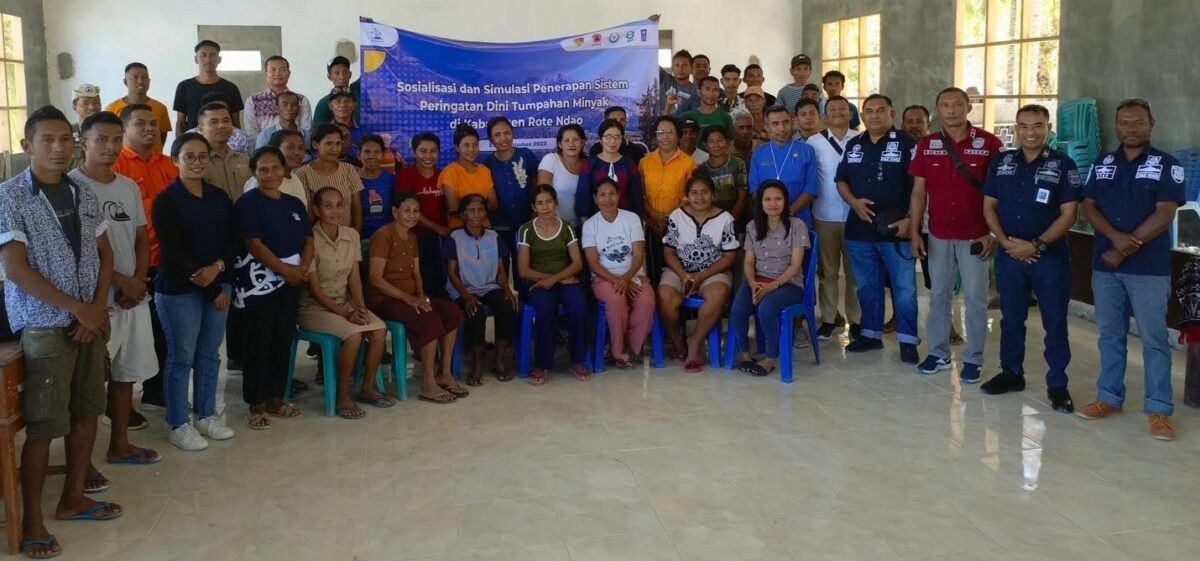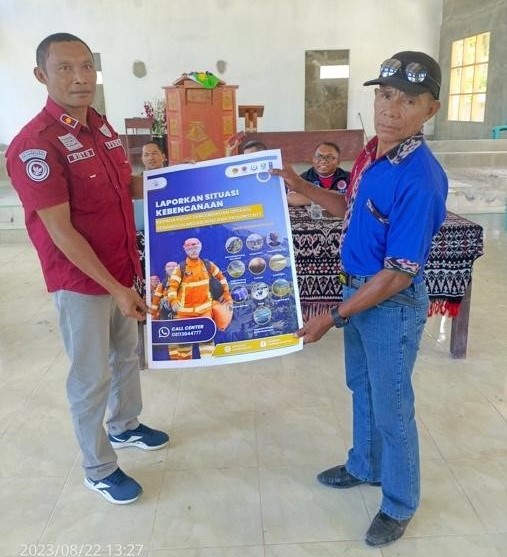In 2009, an oil spill struck Rote Ndao District in Indonesia’s East Nusa Tenggara (Nusa Tenggara Timur/NTT) Province, impacting coastal areas where many local communities rely on the sea for their livelihoods. Today, the threat of a recurrence continues to loom large. Now, important steps are being taken to build awareness, take action and improve preparedness in both the prevention and handling of oil spills.
On 21 and 22 August 2023, the Secretariat of the Marine Pollution Task Force in NTT Province, working in collaboration with the ATSEA-2 Project, conducted a socialisation and simulation of the Oil Spill Early Warning System for three villages in Rote Ndao: Landu Ti’i, Oeseli and Bo’a. A total of 82 people attended the event, comprising 50 men and 32 women, and representing 13 institutions; a mix of government and non-government agencies, along with community groups from the three villages. The primary objective of this initiative was to empower local communities with the knowledge and skills needed to effectively report and respond to marine environmental disasters at the Emergency Operations Centre (Pusat Pengendalian Operasi Penanggulangan Bencana/Pusdalops PB).

The need for environmental awareness and community involvement in protecting the waters of NTT Province has never been more pronounced. Koresyn R. R. Hau, Head of the Environmental Analysis and Information Division at the Housing, Settlements and Environment Office of Rote Ndao District, emphasised this point during the event. She noted that “learning from the catastrophe in 2009, it is crucial for communities to be aware of the early signs of marine pollution and immediately report them to the government for a swift response.”
The Government of NTT Province is actively involved in promoting environmental awareness and disaster mitigation. Gasper N. L. Manisa, Head of the Logistics and Emergency Division at the Provincial Disaster Management Agency (Badan Penanggulangan Bencana Daerah/BPBD) of NTT Province, provided important insights into disaster mitigation policies in the province. He stressed the significance of a Penta Helix collaboration in addressing various types of disasters, including oil spills. Penta Helix is a cooperative framework that involves five key stakeholders – academics as drafters, businessmen as enablers, communities as accelerators, government as regulators and media as expanders – working together to enhance waste management efforts.

Maria A.A.F. Manteiro, an Environmental Impact Analyst at the Department of Environment and Forestry in NTT Province, introduced the Marine Pollution Task Force team, outlining its tasks and responsibilities. She also highlighted various initiatives, including training on data collection and management related to marine pollution, the development of guidelines for data collection, emergency communication training for oil spills, shoreline clean-up techniques, early warning system simulations and regional exchanges under the ATSEA-2 Project, all aimed at enhancing oil spill preparedness and response capabilities. Furthermore, she underscored the team’s reliance on community support to efficiently respond to oil spill incidents through Pusdalops PB.
During the exercise, the communities were guided to simulate the procedures for reporting to the Pusdalops PB in NTT Province. Anton Rangga, a representative of the Landu Tii Village community, played a key role in this simulation, guided by Yoakim D. Masan, an Operator from Pusdalops PB. During the simulation, Rangga successfully compiled a comprehensive report with photos that encompassed important aspects (Who, Where, When, What, Why, How) through the WhatsApp messaging application.
Additionally, the ATSEA-2 team provided posters to be placed/distributed as reminders of the crucial role the community plays in disaster management efforts. Participants actively engaged in discussion sessions where key questions emerged. These questions included the recognition of signs indicating sea pollution from unidentified oil spills, the types of disasters necessitating reporting, and the procedures for reporting incidents beyond oil spills, such as damage to seaweed cultivation caused by high waves.
This training and simulation of the Oil Spill Early Warning System for three villages in Rote Ndao represented a tangible step towards community awareness and readiness in the face of potential oil spills at sea, and other future environmental disasters in NTT Province. Following this briefing, the Marine Pollution Task Force will organise a capacity-building program for Pusdalop PB, focusing on how to handle community reports. Both Pusdalop PB and the Marine Pollution Task Force will also engage in discussions to prepare for future environmental challenges.
By Khaifin


